There is a joke in the State Department about why they so heavily recruit former Peace Corps volunteers. For example, tell a normal person that they are going to have to spend two years in Ethiopia, they blanche a bit. Tell that to a former Peace Corps volunteer and they will likely respond, "cool!" Tell that same normal person that there has been a change of plans and they will actually be going to Liberia, their resume will be on Monster.com by time you finish the sentence. The former Peace Corps volunteer pumps their fist in the air and says, "Even better!" Perhaps this partly explains what prompted us to decide to vacation in the one of the poorest and the recently strife-torn poorest countries in the world.
Eventually we did take off from Nouakchott for the hour and a half flight south to Conakry, arriving late Saturday afternoon. Taking one look at the breeding pestilence that is Conakry, we had wanted to go hiking right away, but were stuck in the capital until we could get our visas sorted out. There is a consulate in Nouakchott, but, despite the fact there are direct flights between the two cities 4 times a week, it has been out of visa stickers for three months, so we got a promissory letter and they took our passports at the airport. We decided to spend the next day on the Isles de Los, the beachy islands about an hour's pirogue ride outside of the city. [Editor's note: Pirogues are traditional wooden canoes with motor boat engines slapped on the back. They are found throughout Africa and are universally leaky.] The docks are notorious for hustlers scamming tourists, but we fell in with the "right" company fairly quickly. There were two American contractors there with a group of their workers. They apparently work six day weeks on the new US Embassy, and then go out to the islands to blow off steam on Sundays. Ray and Tony apparently make an ungodly amount of money, as they had no problem paying an ungodly amount of money for the pigoguier's services. In addition, they speak not a word of French or any other the local languages, and are about as ugly as Americans can be abroad. They cursed at the boat master. "%&$* you! I give you too much money last week! Me no payee more understandee?" The boat master cursed at them. For about an hour. Each. But they took us along for free, happy to have someone to speak English with, and to perhaps translate all the things that people have been saying to them all these weeks. We loaded up the leaky boat with the four of us, plus 10 or so of the Guinean construction staff, a couple beautiful but disconcertingly young girls, one guy with long dreads and a spliff permanently attached to the side of his mouth, and a couple of inexplicable Turks, that spoke only Turkish and were deathly afraid of the water. Matt and I ditched the circus as soon as we hit shore, enjoying the day in the sun on island, then caught a ride back with these clowns. Rasta, the dreadlocked character, ran out of smoke and promptly fell asleep. We hit a wave and one of the Turkish guys through himself across the boat to avoid getting wet, directly into me, just about sending us both overboard. Everyone yelled at each other in languages that they couldn't understand. And a good time was had by all. Did I mention it was free?
An interesting tidbit about transportation in Guinea (and Sierra Leone). Did you ever wonder what happened to your beloved school bus for grade school? Where is good ol' St. Pat's Bus F these days? Well let me tell you. They are plying the roads of West Africa, filled to capacity with people and livestock and baggage. Roof racks have been soddered to the top and the sides plastered with Bob Marley and Madonna stickers. Yes, City of Manchester, Middle Valley Union Free, Plainbrooke, your buses are here. Just in case you cared.
Next day we settled the visa problems, got our visas for Sierra Leone (a bargain at $100 each, payable in hard currency only please), and generally made plans to head up-country the next day. We found what we gambled was a respectable guide at the tourist office, and made plans to depart the next morning. It was a cramped and not surprisingly uncomfortable ride up to Pita, where we spent the night. Pita is a town of traditional weavers and pygmy goats, neither of
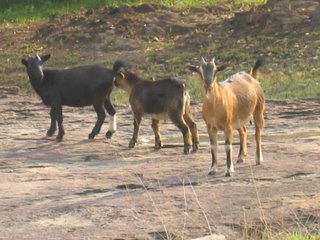 which were all that keen on getting their picture taken. Next morning we grabbed a ride out of town about an hour, our guide riding on the roof of the car because the driver wouldn't let him smoke, and started walking. The first day was about two hours, nothing to strenuous. We arrived at the village where we would spend the night and were shown to our quarters. We were staying in the home of a prosperous villager living in France. You could tell they were prosperous by the number of pots in the bedroom. [Editor's note: A common wedding gift if a set of pots and dishes for the new couple, not unlike the United States. They have yet to adopt our bridal registry system yet though, so everyone just kinda brings pots. The more people at you
which were all that keen on getting their picture taken. Next morning we grabbed a ride out of town about an hour, our guide riding on the roof of the car because the driver wouldn't let him smoke, and started walking. The first day was about two hours, nothing to strenuous. We arrived at the village where we would spend the night and were shown to our quarters. We were staying in the home of a prosperous villager living in France. You could tell they were prosperous by the number of pots in the bedroom. [Editor's note: A common wedding gift if a set of pots and dishes for the new couple, not unlike the United States. They have yet to adopt our bridal registry system yet though, so everyone just kinda brings pots. The more people at you can afford to invite to your wedding, the more pots you get. The more prosperous people you know, the more pots they can afford to give.] It was like something out of Alice in Wonderland, floor to ceiling, everywhere stacked with brightly colored pots. It was a little disconcerting to sleep in. You felt like the pots were watching you. That and it was filled with mosquitoes from the screenless windows. That afternoon we hiked around a bit, seeing the natural rock bridge and some large waterfalls. It felt so good to be in a place where there was more to look at than endless frigging sand dunes.
can afford to invite to your wedding, the more pots you get. The more prosperous people you know, the more pots they can afford to give.] It was like something out of Alice in Wonderland, floor to ceiling, everywhere stacked with brightly colored pots. It was a little disconcerting to sleep in. You felt like the pots were watching you. That and it was filled with mosquitoes from the screenless windows. That afternoon we hiked around a bit, seeing the natural rock bridge and some large waterfalls. It felt so good to be in a place where there was more to look at than endless frigging sand dunes.Next day we hiked over to a little village about two hours away, spending
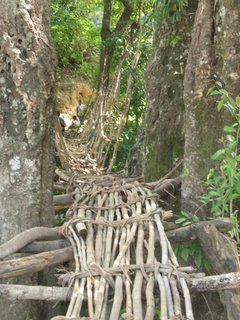 the afternoon hanging out in a traditional hut, which was pretty much all the village had to offer. It was nice, perfectly round and made of smooth mud, with a high conical thatched roof. And lots and lots of really really big spiders living in said thatch. I have to admit I wasn't too upset when the guide decided to move along to spend the night. We headed out across the fields to the next village. Upon leaving the village we had to cross one of the many little rivers in the region. On a bamboo-vine bridge – straight out of a Tarzan movie. Two metal cables are run between trees on opposite sides on the river, about 20 feet off the ground. Then vines are tied to the cables in a v-shape, spaced about six feet apart. Bamboo is then used to connect the vine loops, forming a bridge. The problem is
the afternoon hanging out in a traditional hut, which was pretty much all the village had to offer. It was nice, perfectly round and made of smooth mud, with a high conical thatched roof. And lots and lots of really really big spiders living in said thatch. I have to admit I wasn't too upset when the guide decided to move along to spend the night. We headed out across the fields to the next village. Upon leaving the village we had to cross one of the many little rivers in the region. On a bamboo-vine bridge – straight out of a Tarzan movie. Two metal cables are run between trees on opposite sides on the river, about 20 feet off the ground. Then vines are tied to the cables in a v-shape, spaced about six feet apart. Bamboo is then used to connect the vine loops, forming a bridge. The problem isthat the bamboo is just sort of piled there, not attached in anyway. So you gingerly picked you way across, reaching from vine to vine, hoping to god that the bamboo doesn't move under your feet while you are reaching for the next vine, sending you plunging to the river below. This was frightening.
We arrived at the next village for a "surprise" wedding. Apparently some tourists get a kick out of these things. Matt and I felt intrusive, largely because the chief of the village had a meltdown when he saw us. But the guide wanted to drink and dance, so we ate our rice and went to bed early in our little mud house. And slept about 20 minutes due to noise. Also fun in this village is that I got to shower in an open field. Everyone baths in the river and I was having none of that, so I got a bucket of cold river water and a field. Price you pay for being picky.
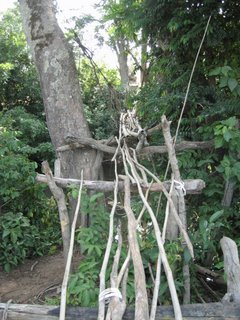
Next day's hike was beautiful but brutal. I am not a hiker-person and it was bleeping hot out. The "highlight" of the day though was crossing yet another bamboo bridge, this one in a much more deteriorated state. I have to admit, this is the most scared I have been on a backpacking trip – I think ever. The bridge was higher. The bamboo was only one 3 inch thick piece in the middle, and even that was badly splintered. I held on to the cables and vines quite literally for my life as I crossed. I was shaking pretty badly when I hit the other side. When we came to the one we had crossed the day before I just about skipped across, it seeming so sturdy in comparison. If my life were a movie, this definitely would have been a good time to contract a stunt double.
And on we went, back to Pita, back to Conakry, spending the night before setting out the next day for Sierra Leone.
We got a bush taxi for Freetown. The trip was uneventful enough, only one flat and we got across the border in less than three hours. Coming into Sierra Leone was interesting though. We cross the Guinea border and drive a few kilometers down the road. There we came to a hand-painted sign (not unlike the ones that would be on a childhood clubhouse) and a tent. The sign said, "Welcome to Sierra Leone." We walked into the tent. There were two men in uniform with guns taking down passport information. These guys were, um, a bit off. Bulging eyes, twitchy, spoke only in halting sentence at full volume. Definitely not good candidates for decommissioning. One of them took our passports and shouted at us, "Why are you here?" We responded, "We are tourists." They looked at us funny. Finally the first guy asked, "Tourists? Can you spell that for me?" As we walked out Matt turns to me and asks, "So do you think they are naturally crazy or just fucked up from all the people they killed?" Dunno brother. We repeated the process three times as we traveled down the road. Have to do something with the former soldiers I guess.
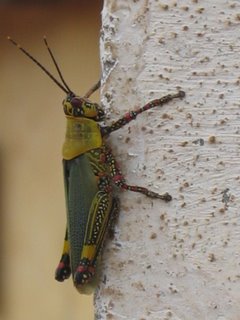
And I really thought vacationing in the poorest country in the world wouldn't bother me much. I lived for two years in the third poorest, had already been in the second poorest, how much worse could it possible be. Ooh. The feeling was slightly similar to arriving in Burkina on the first day of Peace Corps. The sheer level of poverty was disorientating. As far as I can tell, the country is largely constructed of razor wire and tarps from the UNHCR. All of the children are underfed, their hair red from advanced malnutrition. It was the kind of thing that makes you re-examine your priorities. I am at the point with my dealing with the third world were I want a laminated badge and a minister to talk to about increasing direct foreign investment through regulation reform. This place made me want to hop out of the bush taxi, ask directions to the nearest functioning school (which judging by the state of the infrastructure, might have been a healthy walk), and start teaching. Anyone. Anything. I couldn't make the place much worse.
So we arrived in Freetown as the sun was going down. There is no electricity in the city so the whole place was lit with lamp and torch light. It looked eerily like a medieval kingdom as you looked at the flickering lights climbing the hillsides. Except for the NGO and UN residences, glowing brightly in fluorescent light. We checked into a little guesthouse, with an armed guard, a generator bigger than the apartment I had been living in in New York and enough razor wire to intimidate Sing-Sing. Home sweet home.
The next day we looked around town. The place was swelteringly hot and the mid afternoon rain did nothing to break up the humidity. We registered at the American embassy and went out in search of the sights. There were a couple of aging relics from the colonial period (which, when put in the context of the rest of the crumbling infrastructure, are completely unidentifiable without a guidebook.) There is a big tree. An earnest but sad little museum. That is pretty much it. We spent the rest of the afternoon trying to find a new hotel (there had been some sort of altercation outside our room the night before and we were seeking greener pastures.) We went to the two largest (and according to the guidebook, nicest) hotels in town, but they had been converted to camps for the UN troops monitoring the ceasefire. There was a sole-less Chinese built monstrosity, but you can't blame them too much, they were working with the remains of the rebel hilltop strong-hold. We might have even stayed there too had they not explained their credit card billing system as being routed through the First National Bank of Zimbabwe. Eventually we found an overpriced but nice enough place on the beach-edge of town. We made plans to move there soon.
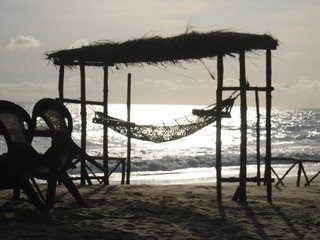
The next day, however, we were bound for the beach. We caught a taxi out to the supposedly best known resort on the Freetown Peninsula. We got there to no guests, no staff except for a bartender, and a bunch of people hanging around trying to either sell us things or be our friends, neither of which we were particularly interested in. Apparently the staff was off at a funeral in a neighboring village but we could wait a while. So we sat on the beach until it started pouring. Then we caught a bus back to town, arriving at the hotel hours later, soaked, cranky and frustrated.
Next day it was all about the chimpanzees. We went to the Tacugama Chimpanzee Reserve. It is a home for chim
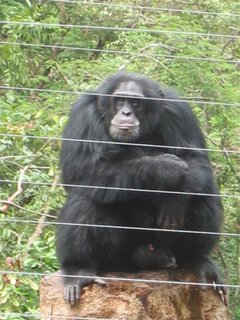 ps that have been too screwed up by humans to return to the wild. Getting there wasn't too bad. We took a mini-bus about 10 kilometers from the middle of town (while might as well have been 1000 for all the infrastructure out there), and walked the last 4. The chimps are in large sanctuaries blocked off by electrical fencing. They looked happy enough. We puttered around with the tour guide for about an hour, listening to the care that they gave them, how they got them, how many they had, etc., and took pictures of the happy monkeys. As we came to last enclosure, the guide warned us that this group had an Alpha-Male named Bruno and he could be a little surly, so pay attention. We were snapping away, not paying too much attention, when this MONSTER monkey comes charging out of the forest. The thing was the size of a gorilla. Holy shit. He jumps up on a stump and raises his arm to throw a rock at us. The guide yells, "Bruno! No! Nice people! No rock Bruno! Nice people! Tourists!" Bruno glares at us again, then throws down the rock like a pissed off three year old. A tense moment passed. He folded his arms. We went back to taking pictures.
ps that have been too screwed up by humans to return to the wild. Getting there wasn't too bad. We took a mini-bus about 10 kilometers from the middle of town (while might as well have been 1000 for all the infrastructure out there), and walked the last 4. The chimps are in large sanctuaries blocked off by electrical fencing. They looked happy enough. We puttered around with the tour guide for about an hour, listening to the care that they gave them, how they got them, how many they had, etc., and took pictures of the happy monkeys. As we came to last enclosure, the guide warned us that this group had an Alpha-Male named Bruno and he could be a little surly, so pay attention. We were snapping away, not paying too much attention, when this MONSTER monkey comes charging out of the forest. The thing was the size of a gorilla. Holy shit. He jumps up on a stump and raises his arm to throw a rock at us. The guide yells, "Bruno! No! Nice people! No rock Bruno! Nice people! Tourists!" Bruno glares at us again, then throws down the rock like a pissed off three year old. A tense moment passed. He folded his arms. We went back to taking pictures.The next few days were uneventful. We hung around the city, which was a truly beautiful stop, surrounded by lush green mountains. It will be a hell of a tourist destination in a few years, if they every rebuild the infrastructure. We went back out to the beach, in nicer weather this time. Hung
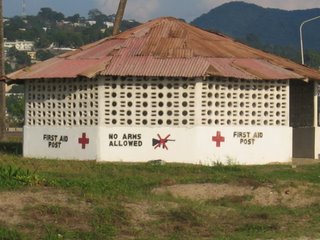 out by the pool. Relaxed. Took pictures of the signs outside things like hospitals and nightclub saying, "No Arms Allowed Inside," with pictures of Klasnikovs with red lines painted through them. As we were checking out of the hotel a few days later, the Hungarian manager comes up to say goodbye. He asks what we had been doing here. We explained that we were tourists. He looks at us incredulously and tells us that in his 10 months of managing the biggest hotel in Sierra Leone, we are his first tourists.
out by the pool. Relaxed. Took pictures of the signs outside things like hospitals and nightclub saying, "No Arms Allowed Inside," with pictures of Klasnikovs with red lines painted through them. As we were checking out of the hotel a few days later, the Hungarian manager comes up to say goodbye. He asks what we had been doing here. We explained that we were tourists. He looks at us incredulously and tells us that in his 10 months of managing the biggest hotel in Sierra Leone, we are his first tourists.Then it was time to go back to Guinea. We decided to fly back, as driving took 10 hours with no
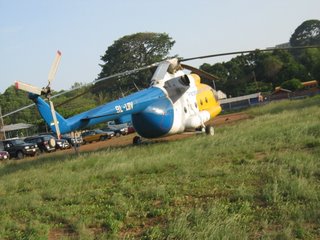 major mishaps. Now the only way to get to the airport in Freetown is by helicopter. I shit you not. So, at 7 am we are at the UN compound to take the helicopter to the airport. There are large numbers of people milling around. There is a guy playing the balophone. Kids are selling snacks. There is a guy in a clown costume trying to explain helicopter safety to people. No one is listening to him. About 15 people at a time fit into the copter, and it takes off straight up over the city. The windows open so you can reach out and take pictures of the city and surrounding countryside. It was really frigging cool.
major mishaps. Now the only way to get to the airport in Freetown is by helicopter. I shit you not. So, at 7 am we are at the UN compound to take the helicopter to the airport. There are large numbers of people milling around. There is a guy playing the balophone. Kids are selling snacks. There is a guy in a clown costume trying to explain helicopter safety to people. No one is listening to him. About 15 people at a time fit into the copter, and it takes off straight up over the city. The windows open so you can reach out and take pictures of the city and surrounding countryside. It was really frigging cool.The plane was less cool. The airline was some less than reputable Lebanese outfit. The plane was old and Russian. The pilots were the same. I hoped to god they were sober. Everything was written in Cyrillic script. There was no safety briefing. No cabin staff. No ventilation (the cabin reeked of mildew), but not to worry, because the seals on the windows were so loose, you could see the water vapor streaming in as we passed through the clouds. But we didn't die, so that's okay.
Then back to Guinea for the night and back to Nouakchott. It was good to be back in the desert.

No comments:
Post a Comment